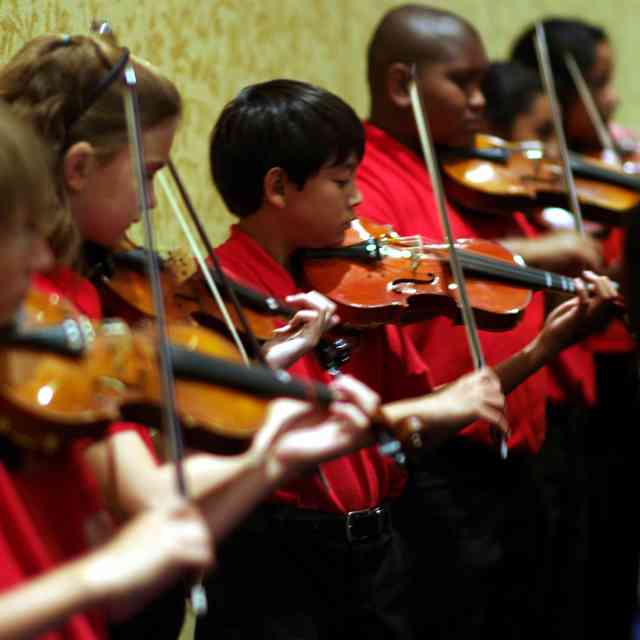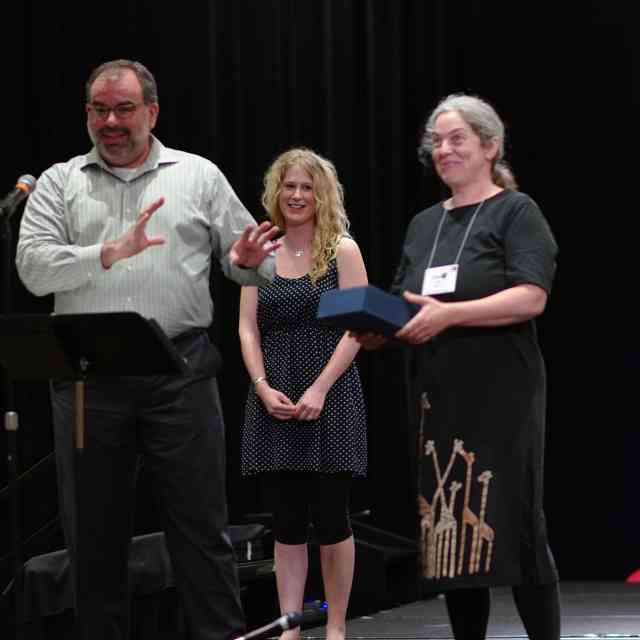I had no idea how cool this was going to be,” Ann Shurtz said to me during the catered snack break on Thursday afternoon.
Ann was a first-time attendee at the Eleventh International Research Symposium on Talent Education, a pre-SAA conference seminar intended to bring Suzuki teachers and researchers together to discuss scientific studies involving practical issues of music teaching and learning. Similar to Ann, many Suzuki teachers joined the seminar not quite knowing what to expect, but found themselves in the midst of informative and engaging discussions with researchers who shared findings from a variety of projects.
Most of the attendees at this year’s seminar were practicing Suzuki teachers who were not involved in research themselves, but who had an interest in learning about the scientific projects that researchers were conducting. During the symposium, researchers presented projects on topics including music and the brain, parent involvement, learning styles, and various means for fostering the development of talent.
Graduate Research “Master Class”
At the beginning of the symposium, two graduate students participated in a research “master class” with Dr. Laurel Trainor, director of the Institute for Music and the Mind at McMaster University. In this master class format (common to music performance but less common to research presentations), graduate students had the opportunity to first present research they were conducting and then to receive immediate feedback from Dr. Trainor in front of the audience.
The first presentation, by Abigail McHugh-Grifa of the Eastman School of Music, centered on the role of parents in children’s music education. In her research, Abigail sought to identify specific elements of Suzuki parents’ experience that would contribute to their success in their role as Suzuki “home-teachers.” By observing traits of 258 parents from across the United States, McHugh-Grifa uncovered two specific influential factors of success: 1. frequency and consistency of Suzuki method behaviors (e.g., practicing, attending group classes, listening, and review), and 2. parents’ reported enjoyment and level of self-belief as home teachers. McHugh-Grifa recommended that teachers should strive to help parents see themselves as home teachers; otherwise, parents may have difficulty adjusting to their responsibilities as Suzuki parents.
In response to Abigail’s presentation, Dr. Trainor commended her asking of a “good question,” thereby making the research worthwhile, and suggested that an exploratory approach is appropriate when a researcher is not exactly sure how to proceed. Dr. Trainor discussed some specifics to improve upon Abigail’s statistical analyses, and recommended that she delve deeper into the relationships that she found (for example, investigating her finding that behaviors and perceptions were independent and unrelated factors). She also suggested separating research participants by age, playing level, and child’s temperament since parent involvement would likely be different for each of these types of children.
The second master class participant was Karin Hallberg of Northern Arizona University, who discussed a research project she is currently designing that she hopes will answer the question, “Does music instruction using the Suzuki method improve working memory and visual-spatial processing in children?” Karin hopes to create an experimental study that she intends to conduct with her own students, in order to provide information about possible effects of music on cognitive functions. Hallberg discussed findings from her literature review, which was drawn from research regarding working memory, expertise and skill acquisition, and the effects of music instruction on working memory, children, and the brain. She plans to create an instructional manual so that other researchers may later replicate her results.
Dr. Trainor made specific recommendations for Hallberg’s study, including lengthening the duration of her experiment; providing some other kind of treatment for the control group so that they would also feel “special;” handling of special-needs students; including more demographic information; and expanding the list of outcomes to be measured. Teachers in the audience also offered insightful ideas, including the importance of accounting for informal learning such as home CD listening, home practice, and playground interaction between students.
Time with Dr. Trainor
After the graduate research master class and a lovely snack break, all symposium participants had an opportunity to ask questions of Dr. Trainor and to clarify points from the earlier session. I noted at this session how Dr. Trainor was able to inspire the research presenters through insightful and thought-provoking recommendations, while also making her discussions understandable and approachable to everyone in attendance.
Other Presentations
In the evening session, three researchers presented studies dealing with the development of musical skills. Kathleen M. Einarson of McMaster University shared details of a research project she is conducting with Dr. Trainor, which examines Kindergarten children’s sensitivity to beat using musical excerpts with either simple versus complex meters. Preliminary findings suggest that musically untrained children are significantly better at detecting beat alignment errors in music with simple meter. They also found that overall musical performance on their video test (based on a beat alignment task) was associated with higher scores on vocabulary and working memory tests. Einarson suggested that early childhood may be an optimal time to introduce students to a wide variety of musical cultures and traditions.
Next, Elizabeth M. Guerriero of Rider University shared her findings from an experimental study that examined maximum efficiency of skill learning without formal practice. She invited undergraduate non-music majors with no previous string experience to perform a simple song, first without training or help, and then again after watching pairs of videos with good versus poor posture. Participants were divided into three groups:1. observation learning, in which students merely watched the pairs without further comment; 2. forced-choice learning, in which participants were asked to make a decision about which video seemed better to them; and 3. goal-shaped learning, in which the participants made a decision about which video they preferred and then received feedback about the correctness of their choice. After performing again, participants in the observation learning and goal-shaped learning groups performed significantly better than before watching the videos (forced-choice learners performed significantly lower in posture after watching the videos). Guerriero suggested that novice learners may be able to perform complex tasks without practice when correct information is presented and they are sufficiently engaged in the learning process.
The last presentation of the day was given by Wen-Fu Li of Tungshih Elementary School in Taiwan. Dr. Li studied attitudes of Taiwanese music teachers toward elementary school musically gifted and talented programs (MGTP). His research analyzed the online survey responses of 146 music teachers from 20 elementary schools in Taiwan. According to Li, results indicated that respondents strongly agreed with the following: 1. learning environment is more important than innate giftedness of students; 2. the criteria in the 2006 revision for entering elementary school MGTP are too high for second grade students; 3. parents’ attitude toward the MGTP strongly impacts their children’s participation in an elementary school MGTP; 4. the goal of elementary school MGTP should not be vocational training but to develop all students’ musical potential; and 5. full-day isolated grouping (ability tracking) is an efficient and necessary approach to administer elementary school MGTPs.
Poster Sessions
On Friday morning, we held our first ever poster session at IRSTE. While research poster sessions traditionally involve a room full of poster displays to which participants can visit and chat with researchers of their choice, our small numbers this first year provided a more intimate gathering in which all attendees could sit and listen to poster presentations and address questions/comments as a group.
Nancy Mitchell from the University of Toronto presented a study she is conducting to examine the role of adjudicated performances in influencing which students are considered musically talented and how musical talent is developed. Mitchell suggests that the quality of student experiences with evaluative performances is affected by several factors, including the student’s musical preferences, work habits, motivational orientation, ability to cope with performance anxiety, and their relationships with parents and teachers. Students whose values align with those of evaluative performance situations will likely do well in evaluative performances, while those whose musical interests and values lie elsewhere are “in danger of being viewed as lacking in musical ability.” Mitchell suggests that we should therefore offer different opportunities for the development of musical potential in students whose abilities lie outside the required curriculum.
After Nancy’s presentation, I presented research observing the influence of competitive performing environments upon perceptions of “safe space” and self-beliefs of music students, and similarly suggested that our traditional music education systems, especially when they have a competitive focus, may not sufficiently support the needs of all music learners. The group discussion format for this poster session provided a unique opportunity for audience members to interact with the researchers. We hope to expand the poster session in future years and to create a forum in which these posters can be accessed by all SAA conference attendees.
Keynote by Dr. Laurel Trainor
On Friday morning Dr. Laurel Trainor gave a keynote address, “Neural Plasticity and the Effects of Musical Experience on the Brain,” to all attendees at the SAA conference. In her fascinating yet down-to-earth presentation, Dr. Trainor shared with us some of the promising findings of neuroscience research in music that can help us study behaviors that are difficult to see, test our intuitions about music learning, improve teaching, and assist in advocating the significant place of music in education and society.
Dr. Trainor demonstrated evidence of music learning from a very early age, with infants as young as two months of age showing a preference for consonance over dissonance and preference in timbre. She suggested from this research that timbre and sound quality really does matter, even from the beginning of a student’s musical life. She also shared other research demonstrating the effect of environment and culture upon musical preference and ability to perform tasks in simple versus complex meter.
At the end of her presentation, Dr. Trainor highlighted recent research observing the role of music in social development, especially in the ability of music participation to elicit experiences of empathy in infants. Dr. Trainor’s unique ability to cross bridges between research and practice resulted in an engaging presentation of brain research that left many of us wanting to hear more (and, for those who are indeed interested, many of Dr. Trainor’s publications can be accessed at http://www.psychology.mcmaster.ca/ljt/publications.htm ).
The symposium concluded with a question and answer session in which participants had an opportunity to ask Dr. Trainor about any further questions they had. During this final session I was again impressed by her ability to talk about complex research principles in a way that was interesting and approachable to everyone. Research and practice were wonderfully balanced throughout the entire symposium, making it a place for teachers and researchers to both contribute and benefit from the discussions.
IRSTE in the Future
Continuing in the tradition of bringing researchers and teachers together, we hope that the next IRSTE will be a forum in which Suzuki teachers can bring their ideas and resources to help researchers create an actual collaborative research project that will answer practical questions of practicing Suzuki teachers, and foster even better teaching among our Suzuki community. We invite any and all Suzuki teachers with even the smallest interest in research (and any level of experience) to bring your questions and ideas and participate with us in 2014!









